Burt A. The Evolution of the British Empire and Commonwealth From the American Revolution
Подождите немного. Документ загружается.

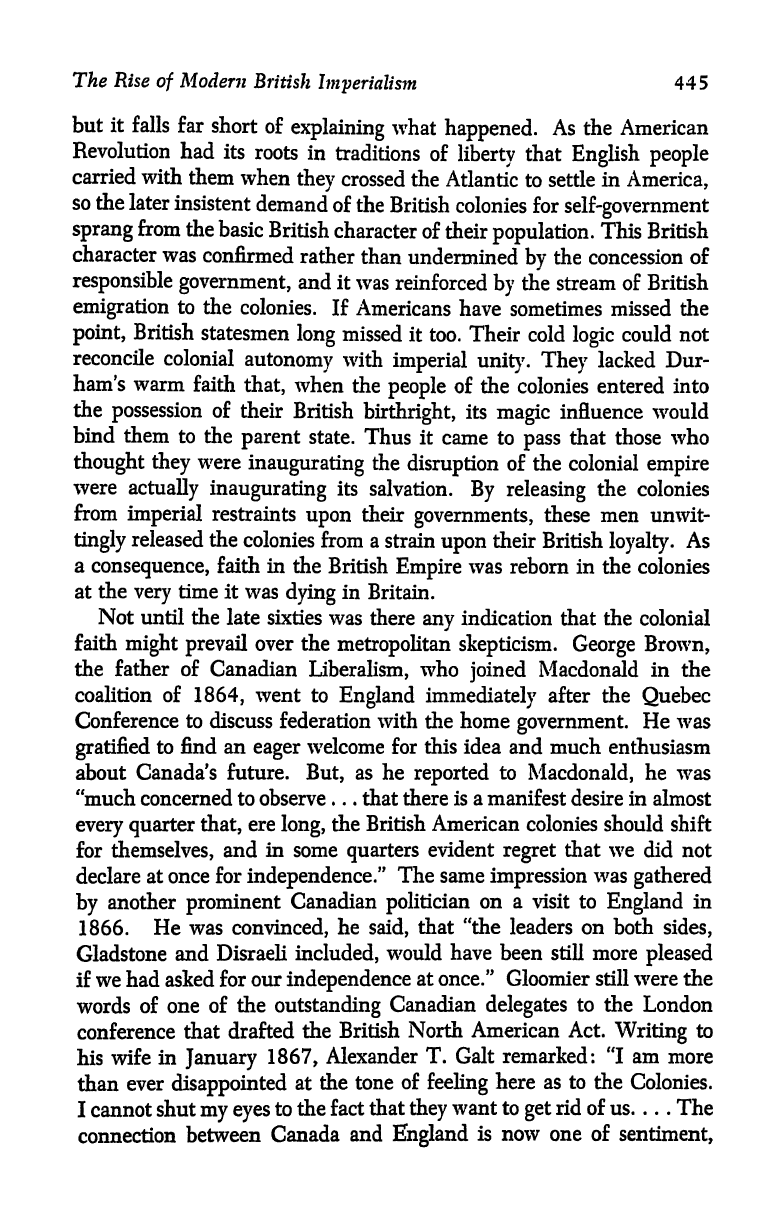
The Rise
of
Modern
British
Imperialism
445
but
it
falls
far
short
of
explaining
what
happened.
As
the American
Revolution
had
its
roots
in
traditions
of
liberty
that
English
people
carried
with
them
when
they
crossed the
Atlantic to
settle
in
America,
so
the
later
insistent
demand
of
the
British
colonies
for
self-government
sprang
from
the
basic
British
character of
their
population.
This British
character
was
confirmed
rather
than
undermined
by
the concession
of
responsible
government,
and
it
was
reinforced
by
the stream of
British
emigration
to
the
colonies.
If
Americans
have
sometimes missed
the
point,
British
statesmen
long
missed
it
too. Their
cold
logic
could
not
reconcile
colonial
autonomy
with
imperial
unity.
They
lacked
Dur-
ham's
warm
faith
that,
when
the
people
of the colonies entered into
the
possession
of their
British
birthright,
its
magic
influence would
bind them
to
the
parent
state.
Thus
it
came
to
pass
that those who
thought
they
were
inaugurating
the
disruption
of the colonial
empire
were
actually
inaugurating
its
salvation.
By
releasing
the colonies
from
imperial
restraints
upon
their
governments,
these men unwit-
tingly
released the
colonies
from a
strain
upon
their
British
loyalty.
As
a
consequence,
faith in
the
British
Empire
was reborn in
the colonies
at
the
very
time
it
was
dying
in
Britain.
Not
until the
late sixties
was there
any
indication
that the colonial
faith
might
prevail
over the
metropolitan skepticism.
George
Brown,
the father of
Canadian
Liberalism,
who
joined
Macdonald
in the
coalition of
1864,
went
to
England
immediately
after
the
Quebec
Conference
to discuss
federation
with
the
home
government.
He was
gratified
to find
an
eager
welcome for
this
idea
and
much
enthusiasm
about
Canada's
future.
But,
as
he
reported
to
Macdonald,
he was
"much concerned to observe .
. .
that there is
a
manifest
desire
in
almost
every quarter
that,
ere
long,
the
British American colonies
should shift
for
themselves,
and
in
some
quarters
evident
regret
that we
did not
declare
at once
for
independence."
The
same
impression
was
gathered
by
another
prominent
Canadian
politician
on
a
visit to
England
in
1866.
He
was
convinced,
he
said,
that "the
leaders on both
sides,
Gladstone
and
Disraeli
included,
would
have been still more
pleased
if we
had asked for
our
independence
at once."
Gloomier still
were the
words
of one
of
the
outstanding
Canadian
delegates
to the
London
conference
that
drafted
the
British North
American
Act.
Writing
to
his wife
in
January
1867,
Alexander
T.
Gait
remarked:
"I
am
more
than
ever
disappointed
at
the tone
of
feeling
here as
to
the
Colonies.
I cannot
shut
my eyes
to
the fact
that
they
want
to
get
rid of us.
...
The
connection
between
Canada
and
England
is
now
one of
sentiment,
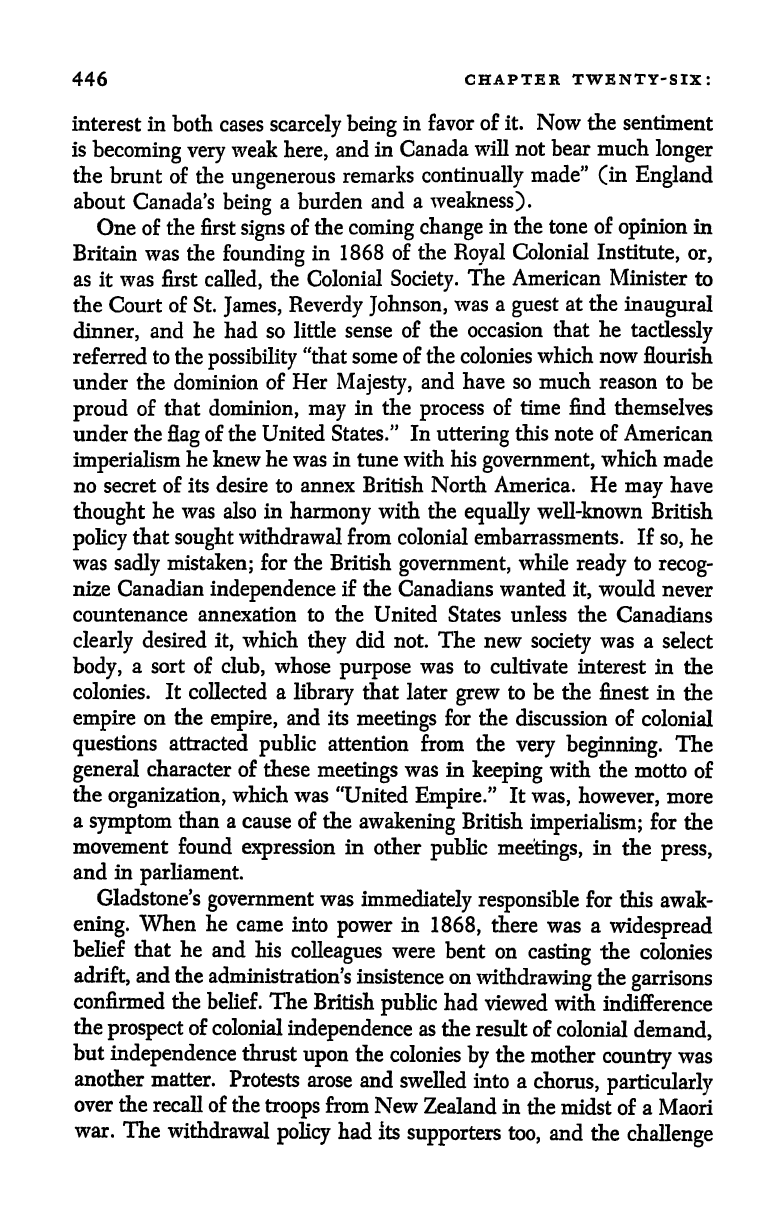
446
CHAPTER
TWENTY-SIX:
interest in both cases
scarcely
being
in favor
of it. Now the
sentiment
is
becoming
very
weak
here,
and
in Canada
will not bear
much
longer
the
brunt of
the
ungenerous
remarks
continually
made"
(in
England
about
Canada's
being
a burden
and a
weakness).
One of
the
first
signs
of
the
coming change
in the tone
of
opinion
in
Britain was
the
founding
in
1868
of
the
Royal
Colonial
Institute,
or,
as
it
was
first
called,
the
Colonial
Society.
The
American
Minister
to
the Court of
St.
James,
Reverdy
Johnson,
was
a
guest
at
the
inaugural
dinner,
and
he had so little
sense of
the occasion
that
he
tactlessly
referred to
the
possibility
"that some
of the
colonies
which
now
flourish
under the dominion
of
Her
Majesty,
and
have so much reason to
be
proud
of
that
dominion,
may
in the
process
of time find
themselves
under
the
flag
of
the United States."
In
uttering
this
note of
American
imperialism
he knew
he was in tune with his
government,
which
made
no secret of
its
desire
to
annex British North America. He
may
have
thought
he was also in
harmony
with the
equally
well-known
British
policy
that
sought
withdrawal from
colonial embarrassments. If
so,
he
was
sadly
mistaken;
for the
British
government,
while
ready
to
recog-
nize
Canadian
independence
if
the Canadians wanted
it,
would
never
countenance annexation to
the United States unless
the
Canadians
clearly
desired
it,
which
they
did not. The new
society
was a
select
body,
a
sort of
club,
whose
purpose
was
to
cultivate
interest in
the
colonies. It collected a
library
that later
grew
to be the
finest
in
the
empire
on the
empire,
and its
meetings
for
the
discussion
of
colonial
questions
attracted
public
attention
from
the
very
beginning.
The
general
character of these
meetings
was
in
keeping
with the
motto
of
the
organization,
which was
"United
Empire."
It
was,
however,
more
a
symptom
than a
cause
of
the
awakening
British
imperialism;
for
the
movement
found
expression
in other
public
meetings,
in
the
press,
and
in
parliament.
Gladstone's
government
was
immediately
responsible
for this
awak-
ening.
When he
came
into
power
in
1868,
there
was
a
widespread
belief that
he
and
his
colleagues
were
bent
on
casting
the
colonies
adrift,
and
the
administration's
insistence on
withdrawing
the
garrisons
confirmed the
belief.
The
British
public
had
viewed with
indifference
the
prospect
of
colonial
independence
as
the
result of
colonial
demand,
but
independence
thrust
upon
the
colonies
by
the
mother
country
was
another
matter.
Protests
arose
and
swelled into a
chorus,
particularly
over the
recall of
the
troops
from
New
Zealand in
the
midst
of
a
Maori
war.
The
withdrawal
policy
had its
supporters
too,
and
the
challenge
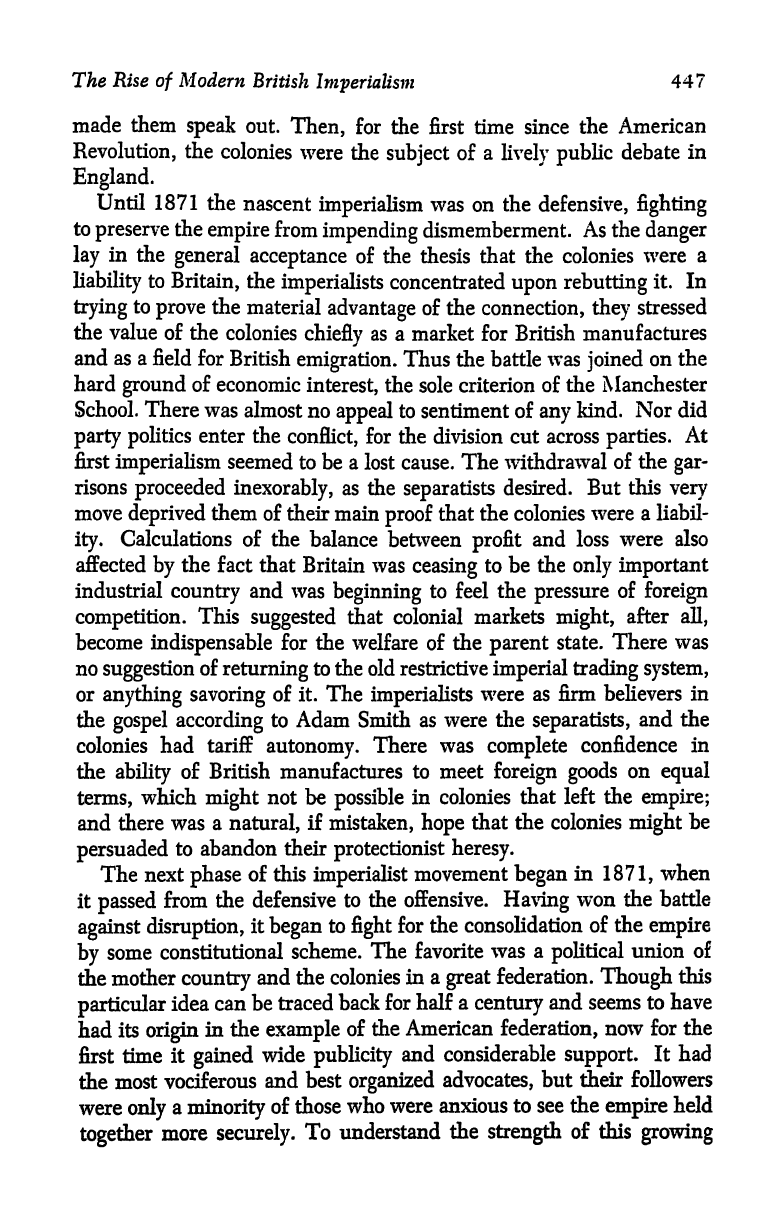
The
Rise
of
Modern
British
Imperialism
447
made
them
speak
out.
Then,
for
the first time since
the
American
Revolution,
the
colonies
were
the
subject
of
a
lively public
debate
in
England.
Until 1871
the
nascent
imperialism
was on
the
defensive,
fighting
to
preserve
the
empire
from
impending
dismemberment.
As
the
danger
lay
in
the
general
acceptance
of the thesis
that
the
colonies
were
a
liability
to
Britain,
the
imperialists
concentrated
upon
rebutting
it.
In
trying
to
prove
the
material
advantage
of
the
connection,
they
stressed
the value
of
the
colonies
chiefly
as
a
market
for
British manufactures
and as
a
field for
British
emigration.
Thus the battle
was
joined
on
the
hard
ground
of economic
interest,
the sole criterion of
the
Manchester
School. There
was almost
no
appeal
to sentiment
of
any
kind.
Nor did
party politics
enter
the
conflict,
for the division cut across
parties.
At
first
imperialism
seemed to be a
lost cause. The
withdrawal
of
the
gar-
risons
proceeded
inexorably,
as the
separatists
desired.
But
this
very
move
deprived
them
of their
main
proof
that the colonies
were a liabil-
ity.
Calculations
of
the
balance
between
profit
and
loss
were
also
affected
by
the
fact that
Britain
was
ceasing
to
be
the
only important
industrial
country
and
was
beginning
to feel
the
pressure
of
foreign
competition.
This
suggested
that
colonial
markets
might,
after
all,
become
indispensable
for
the
welfare
of
the
parent
state.
There was
no
suggestion
of
returning
to the old restrictive
imperial
trading
system,
or
anything
savoring
of it.
The
imperialists
were as firm
believers
in
the
gospel according
to Adam
Smith
as were
the
separatists,
and
the
colonies
had
tariff
autonomy.
There
was
complete
confidence
in
the
ability
of
British
manufactures
to meet
foreign
goods
on
equal
terms,
which
might
not be
possible
in colonies
that left
the
empire;
and there
was
a
natural,
if
mistaken,
hope
that the colonies
might
be
persuaded
to
abandon
their
protectionist
heresy.
The
next
phase
of
this
imperialist
movement
began
in
1871,
when
it
passed
from
the defensive
to
the offensive.
Having
won the battle
against
disruption,
it
began
to
fight
for the consolidation
of
the
empire
by
some
constitutional
scheme.
The favorite
was
a
political
union
of
the mother
country
and
the colonies
in a
great
federation.
Though
this
particular
idea can
be
traced back for half
a
century
and
seems to have
had its
origin
in
the
example
of the
American
federation,
now
for
the
first
time
it
gained
wide
publicity
and considerable
support.
It
had
the
most
vociferous
and
best
organized
advocates,
but
their
followers
were
only
a
minority
of
those
who
were anxious to
see the
empire
held
together
more
securely.
To
understand
the
strength
of this
growing
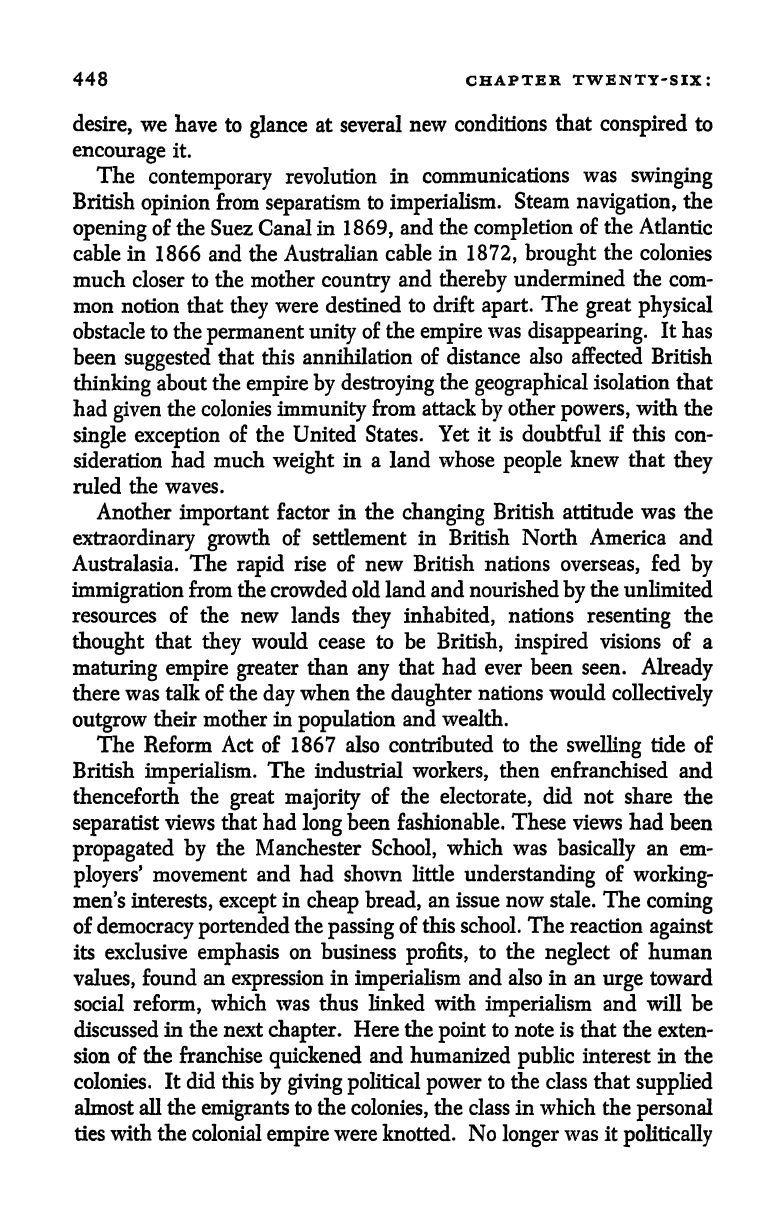
448 CHAPTER TWENTY-SIX:
desire,
we
have to
glance
at
several
new conditions
that
conspired
to
encourage
it.
The
contemporary
revolution
in
communications
was
swinging
British
opinion
from
separatism
to
imperialism.
Steam
navigation,
the
opening
of
the
Suez
Canal
in
1869,
and the
completion
of
the
Atlantic
cable in
1866 and
the
Australian
cable
in
1872,
brought
the
colonies
much
closer to
the mother
country
and
thereby
undermined the
com-
mon
notion
that
they
were destined
to drift
apart.
The
great
physical
obstacle
to
the
permanent
unity
of
the
empire
was
disappearing.
It
has
been
suggested
that
this
annihilation
of distance
also
affected British
thinking
about
the
empire
by destroying
the
geographical
isolation
that
had
given
the colonies
immunity
from
attack
by
other
powers,
with
the
single
exception
of
the United States.
Yet it is doubtful if this
con-
sideration had
much
weight
in a
land
whose
people
knew that
they
ruled the
waves.
Another
important
factor
in
the
changing
British attitude was
the
extraordinary growth
of settlement
in British North
America
and
Australasia. The
rapid
rise of new British
nations
overseas,
fed
by
immigration
from
the crowded old land
and
nourished
by
the
unlimited
resources of the new
lands
they
inhabited,
nations
resenting
the
thought
that
they
would
cease
to be
British,
inspired
visions of a
maturing empire greater
than
any
that had
ever been seen.
Already
there
was
talk
of
the
day
when the
daughter
nations
would
collectively
outgrow
their
mother
in
population
and wealth.
The Reform
Act of
1867
also
contributed
to the
swelling
tide
of
British
imperialism.
The
industrial
workers,
then
enfranchised
and
thenceforth
the
great
majority
of
the
electorate,
did
not
share
the
separatist
views
that
had
long
been
fashionable.
These
views
had
been
propagated
by
the
Manchester
School,
which was
basically
an
em-
ployers'
movement
and
had
shown
little
understanding
of
working-
men's
interests,
except
in
cheap
bread,
an issue now stale. The
coming
of
democracy portended
the
passing
of
this
school.
The
reaction
against
its exclusive
emphasis
on business
profits,
to
the
neglect
of
human
values,
found
an
expression
in
imperialism
and also
in
an
urge
toward
social
reform,
which was thus linked with
imperialism
and will be
discussed
in the next
chapter.
Here the
point
to
note is
that the exten-
sion
of the
franchise
quickened
and humanized
public
interest in the
colonies.
It did this
by
giving
political
power
to the class that
supplied
almost
all the
emigrants
to
the
colonies,
the
class in
which the
personal
ties with the
colonial
empire
were
knotted. No
longer
was
it
politically
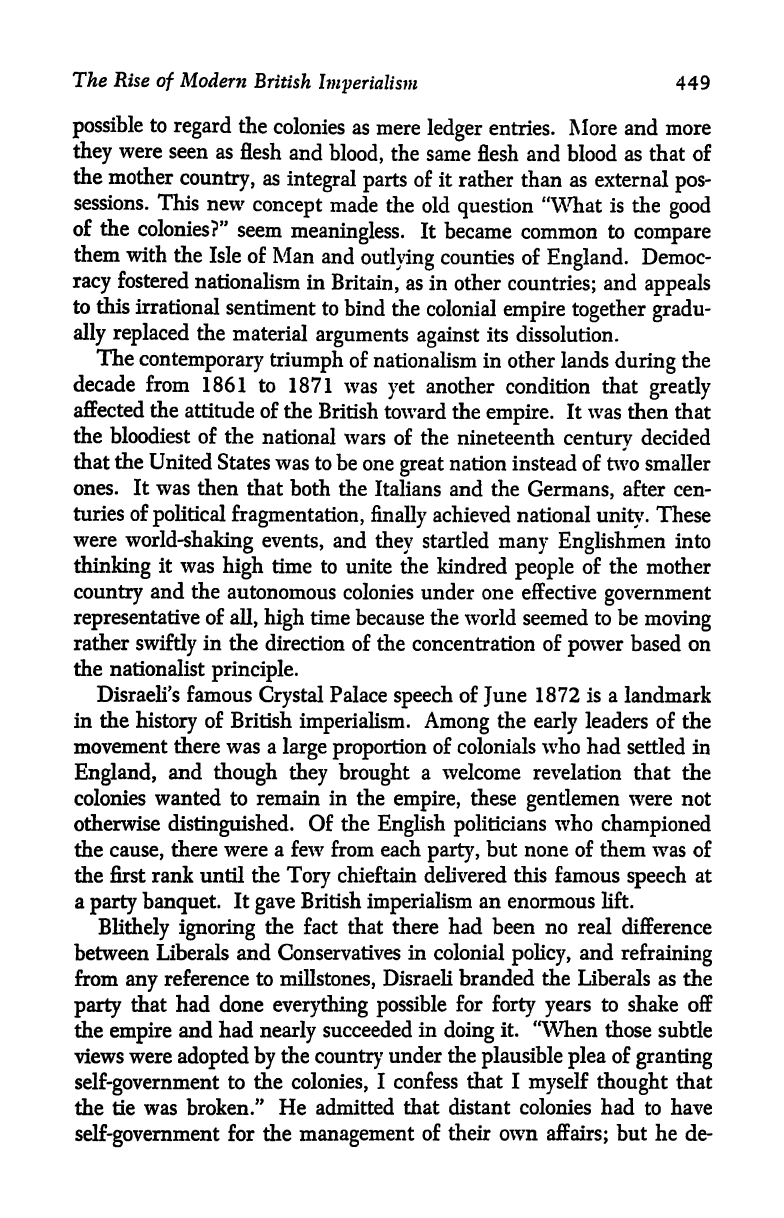
The Rise
of
Modern
British
Imperialism
449
possible
to
regard
the
colonies
as mere
ledger
entries.
More
and more
they
were
seen
as
flesh
and
blood,
the
same
flesh
and blood
as that of
the
mother
country,
as
integral
parts
of
it
rather than as
external
pos-
sessions.
This
new
concept
made the
old
question
"What
is the
good
of
the
colonies?"
seem
meaningless.
It
became
common
to
compare
them
with
the
Isle
of
Man
and
outlying
counties of
England.
Democ-
racy
fostered
nationalism
in
Britain,
as in
other
countries;
and
appeals
to this
irrational
sentiment
to
bind
the
colonial
empire
together
gradu-
ally replaced
the
material
arguments
against
its dissolution.
The
contemporary
triumph
of
nationalism in other lands
during
the
decade
from
1861
to
1871
was
yet
another
condition
that
greatly
affected
the
attitude
of
the
British
toward the
empire.
It
was
then
that
the
bloodiest
of
the
national
wars
of the
nineteenth
century
decided
that
the
United
States
was to
be
one
great
nation
instead of two
smaller
ones.
It was
then
that
both the
Italians and
the
Germans,
after cen-
turies of
political
fragmentation,
finally
achieved national
unity.
These
were
world-shaking
events,
and
they
startled
many
Englishmen
into
thinking
it
was
high
time
to unite the
kindred
people
of the mother
country
and the
autonomous colonies
under one effective
government
representative
of
all,
high
time
because
the
world
seemed
to
be
moving
rather
swiftly
in
the
direction
of
the
concentration of
power
based
on
the nationalist
principle.
Disraeli's famous
Crystal
Palace
speech
of
June
1872 is a
landmark
in the
history
of
British
imperialism.
Among
the
early
leaders of the
movement there was a
large proportion
of colonials who
had
settled
in
England,
and
though they brought
a
welcome
revelation that
the
colonies wanted to
remain in the
empire,
these
gentlemen
were not
otherwise
distinguished.
Of the
English politicians
who
championed
the
cause,
there
were
a
few from each
party,
but none
of them
was of
the
first rank until the
Tory
chieftain delivered
this
famous
speech
at
a
party
banquet.
It
gave
British
imperialism
an enormous
lift.
Blithely
ignoring
the
fact
that there had been no
real difference
between
Liberals and Conservatives
in
colonial
policy,
and
refraining
from
any
reference to
millstones,
Disraeli
branded
the
Liberals as the
party
that
had done
everything
possible
for
forty years
to
shake off
the
empire
and had
nearly
succeeded
in
doing
it.
"When
those
subtle
views
were
adopted
by
the
country
under
the
plausible
plea
of
granting
self-government
to
the
colonies,
I confess
that I
myself
thought
that
the tie was broken." He admitted
that
distant colonies
had
to
have
self-government
for the
management
of
their
own
affairs;
but
he
de-
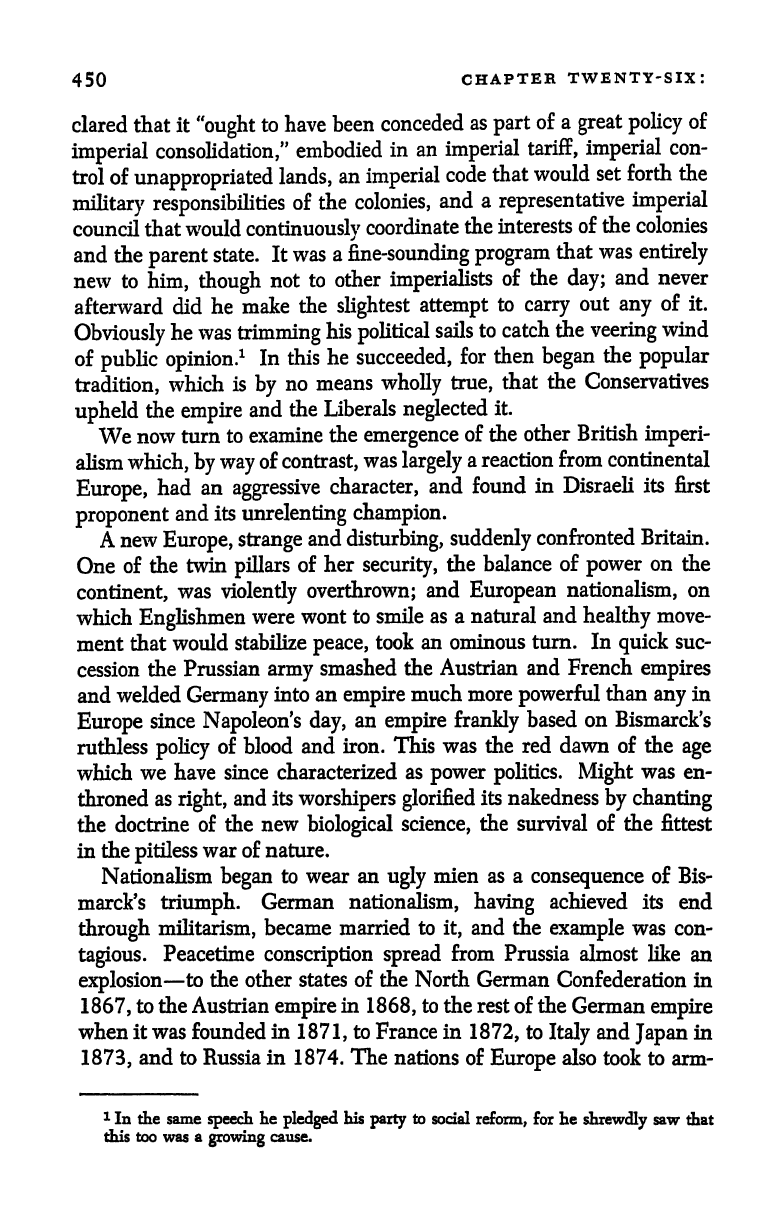
450
CHAPTER
TWENTY-SIX:
clared that
it
"ought
to have been
conceded
as
part
of a
great
policy
of
imperial
consolidation,"
embodied
in
an
imperial
tariff,
imperial
con-
trol of
unappropriated
lands,
an
imperial
code
that
would
set forth the
military responsibilities
of
the
colonies,
and
a
representative
imperial
council that would
continuously
coordinate
the
interests
of
the
colonies
and
the
parent
state.
It
was
a
fine-sounding
program
that
was
entirely
new to
him,
though
not to
other
imperialists
of
the
day;
and
never
afterward
did he
make
the
slightest
attempt
to
carry
out
any
of it.
Obviously
he was
trimming
his
political
sails
to catch the
veering
wind
of
public opinion.
1
In
this
he
succeeded,
for
then
began
the
popular
tradition,
which
is
by
no
means
wholly
true,
that
the Conservatives
upheld
the
empire
and
the
Liberals
neglected
it.
We now
turn
to examine
the
emergence
of
the
other
British
imperi-
alism
which,
by
way
of
contrast,
was
largely
a reaction
from
continental
Europe,
had
an
aggressive
character,
and found
in Disraeli
its
first
proponent
and
its
unrelenting
champion.
A
new
Europe,
strange
and
disturbing,
suddenly
confronted
Britain.
One
of the
twin
pillars
of
her
security,
the
balance
of
power
on
the
continent,
was
violently
overthrown;
and
European
nationalism,
on
which
Englishmen
were wont
to
smile as a
natural
and
healthy
move-
ment
that
would
stabilize
peace,
took
an ominous
turn.
In
quick
suc-
cession
the
Prussian
army
smashed
the
Austrian and
French
empires
and
welded
Germany
into an
empire
much
more
powerful
than
any
in
Europe
since
Napoleon's day,
an
empire
frankly
based on
Bismarck's
ruthless
policy
of
blood
and
iron.
This
was the red dawn of the
age
which
we
have
since characterized
as
power politics. Might
was en-
throned
as
right,
and its
worshipers
glorified
its nakedness
by
chanting
the doctrine
of the
new
biological
science,
the survival of the
fittest
in
the
pitiless
war
of
nature.
Nationalism
began
to
wear
an
ugly
mien as a
consequence
of Bis-
marck's
triumph.
German
nationalism,
having
achieved its
end
through
militarism,
became married to
it,
and
the
example
was con-
tagious.
Peacetime
conscription spread
from
Prussia
almost like
an
explosion
to the
other
states of the North German
Confederation in
1867,
to
the
Austrian
empire
in
1868,
to
the rest
of
the
German
empire
when
it
was founded
in
1871,
to
France
in
1872,
to
Italy
and
Japan
in
1873,
and to Russia
in 1874. The
nations of
Europe
also
took to arm-
1
In the
same
speech
he
pledged
his
party
to
social
reform,
for he
shrewdly
saw
that
this too
was
a
growing
cause.
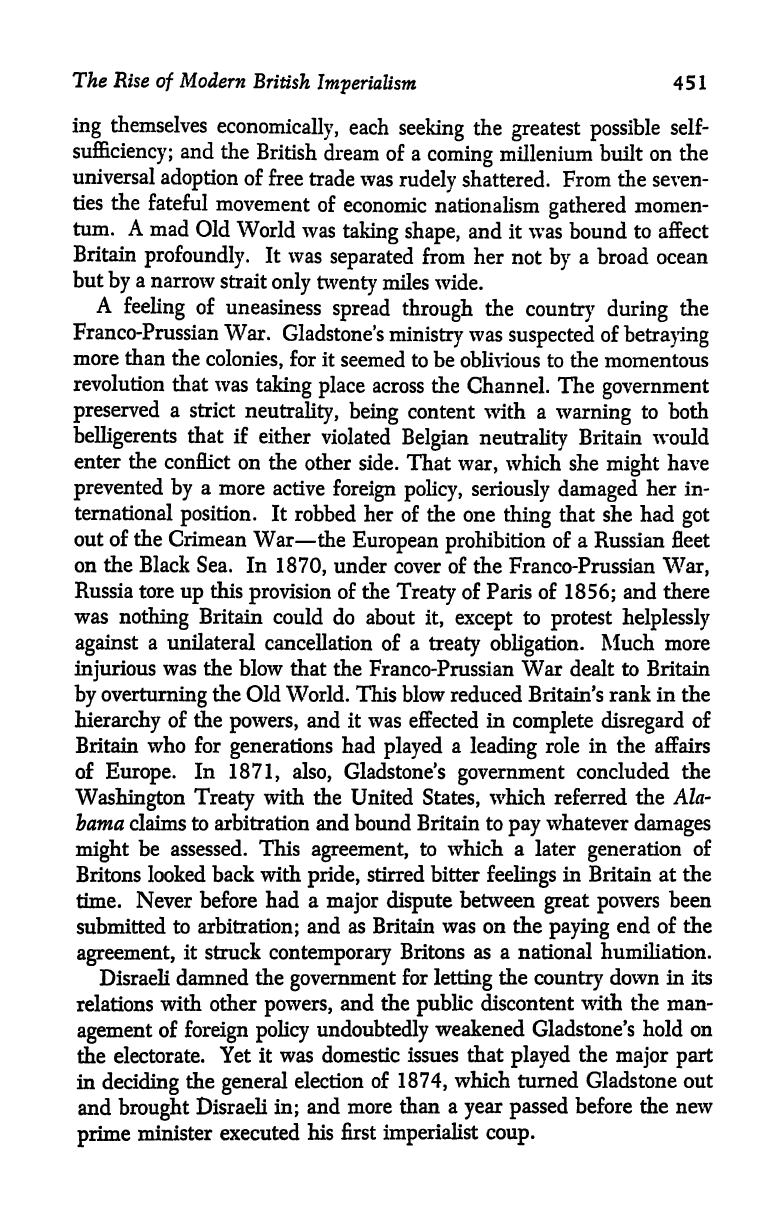
The Rise
of
Modern
British
Imperialism
451
ing
themselves
economically,
each
seeking
the
greatest possible
self-
sufficiency;
and
the
British
dream
of
a
coming
millenium
built
on
the
universal
adoption
of
free
trade
was
rudely
shattered.
From
the seven-
ties the
fateful
movement
of
economic
nationalism
gathered
momen-
tum.
A
mad
Old
World
was
taking shape,
and it was
bound
to
affect
Britain
profoundly.
It
was
separated
from her
not
by
a broad ocean
but
by
a
narrow
strait
only
twenty
miles wide.
A
feeling
of
uneasiness
spread
through
the
country
during
the
Franco-Prussian
War.
Gladstone's
ministry
was
suspected
of
betraying
more than
the
colonies,
for it
seemed
to
be
oblivious to the momentous
revolution
that
was
taking
place
across the
Channel. The
government
preserved
a
strict
neutrality,
being
content
with a
warning
to both
belligerents
that
if
either
violated
Belgian
neutrality
Britain would
enter
the
conflict
on
the
other side. That
war,
which she
might
have
prevented by
a
more
active
foreign policy,
seriously damaged
her in-
ternational
position.
It
robbed her
of
the
one
thing
that she had
got
out of the
Crimean War
the
European
prohibition
of
a Russian fleet
on
the
Black Sea.
In
1870,
under cover
of the Franco-Prussian
War,
Russia
tore
up
this
provision
of the
Treaty
of
Paris of
1856;
and
there
was
nothing
Britain
could
do about
it,
except
to
protest
helplessly
against
a
unilateral
cancellation
of
a
treaty obligation.
Much more
injurious
was the
blow that
the
Franco-Prussian
War dealt to Britain
by
overturning
the
Old World.
This blow reduced
Britain's
rank in
the
hierarchy
of the
powers,
and
it
was
effected
in
complete
disregard
of
Britain who for
generations
had
played
a
leading
role in the affairs
of
Europe.
In
1871,
also,
Gladstone's
government
concluded
the
Washington
Treaty
with the United
States,
which referred
the
Ala-
bama claims
to arbitration
and bound
Britain
to
pay
whatever
damages
might
be
assessed. This
agreement,
to
which a later
generation
of
Britons looked back
with
pride,
stirred bitter
feelings
in Britain at the
time. Never
before had a
major
dispute
between
great powers
been
submitted
to
arbitration;
and
as Britain was on the
paying
end of
the
agreement,
it
struck
contemporary
Britons as
a
national humiliation.
Disraeli
damned
the
government
for
letting
the
country
down
in its
relations
with
other
powers,
and
the
public
discontent
with
the man-
agement
of
foreign
policy
undoubtedly
weakened Gladstone's hold on
the
electorate.
Yet it was domestic
issues
that
played
the
major
part
in
deciding
the
general
election of
1874,
which turned
Gladstone
out
and
brought
Disraeli
in;
and
more than
a
year
passed
before the new
prime
minister
executed
his
first
imperialist
coup.
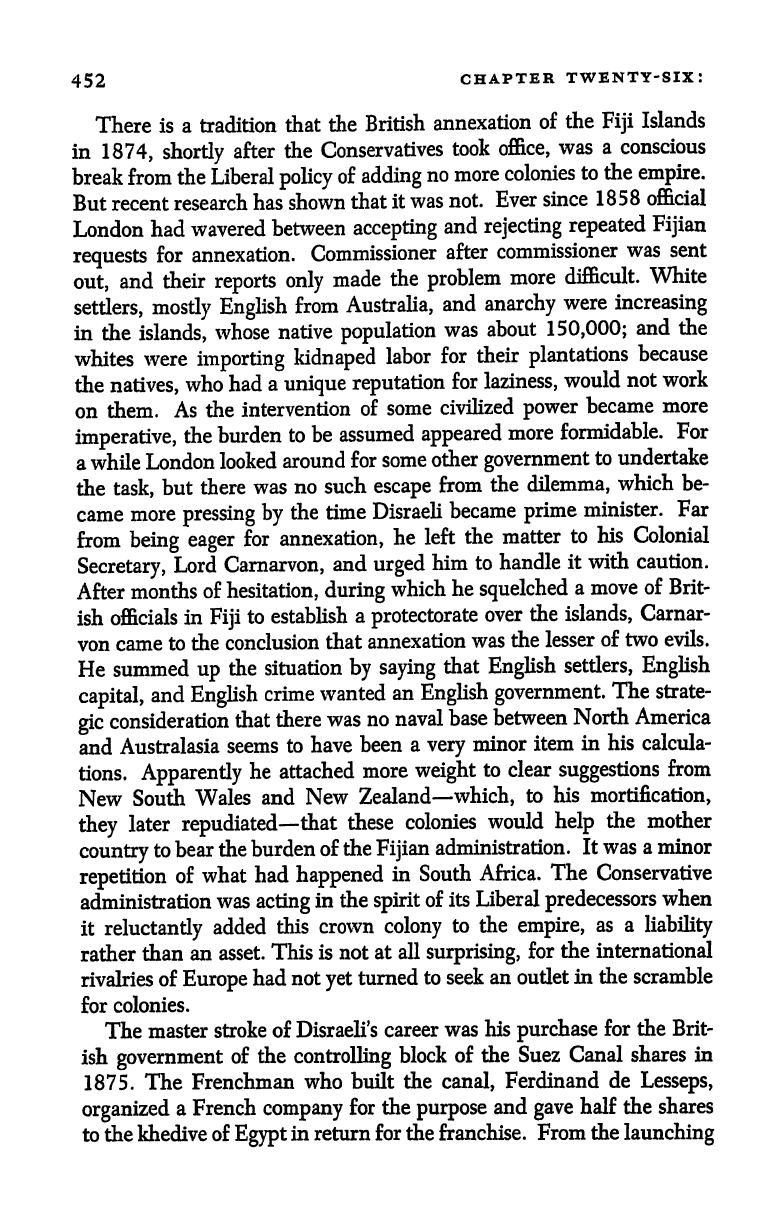
452
CHAPTER
TWENTY-SIX:
There is
a tradition
that
the
British
annexation
of
the
Fiji
Islands
in
1874,
shortly
after
the
Conservatives
took
office,
was
a conscious
break from
the
Liberal
policy
of
adding
no
more
colonies
to
the
empire.
But recent research
has shown
that
it
was not.
Ever
since
1858
official
London
had wavered
between
accepting
and
rejecting
repeated
Fijian
requests
for annexation.
Commissioner
after
commissioner
was sent
out,
and
their
reports
only
made
the
problem
more
difficult.
White
settlers,
mostly English
from
Australia,
and
anarchy
were
increasing
in
the
islands,
whose
native
population
was
about
150,000;
and the
whites
were
importing
kidnaped
labor
for
their
plantations
because
the
natives,
who had
a
unique
reputation
for
laziness,
would
not
work
on
them.
As the
intervention
of
some
civilized
power
became
more
imperative,
the
burden
to
be
assumed
appeared
more
formidable.
For
a
while
London
looked
around
for
some
other
government
to undertake
the
task,
but
there
was
no such
escape
from
the
dilemma,
which
be-
came
more
pressing
by
the time
Disraeli
became
prime
minister.
Far
from
being
eager
for
annexation,
he left
the matter
to
his Colonial
Secretary,
Lord
Carnarvon,
and
urged
him
to
handle
it
with caution.
After
months
of
hesitation,
during
which
he
squelched
a move
of Brit-
ish
officials
in
Fiji
to
establish
a
protectorate
over
the
islands,
Carnar-
von
came
to the
conclusion
that
annexation
was
the lesser
of two evils.
He summed
up
the
situation
by
saying
that
English
settlers,
English
capital,
and
English
crime
wanted
an
English government.
The strate-
gic
consideration
that
there
was
no
naval
base
between
North America
and
Australasia
seems
to
have
been
a
very
minor
item
in
his calcula-
tions.
Apparently
he
attached
more
weight
to clear
suggestions
from
New
South
Wales
and
New
Zealand
which,
to his
mortification,
they
later
repudiated
that
these
colonies
would
help
the
mother
country
to
bear
the burden
of
the
Fijian
administration.
It was
a
minor
repetition
of
what
had
happened
in
South
Africa.
The
Conservative
administration
was
acting
in
the
spirit
of
its Liberal
predecessors
when
it
reluctantly
added
this crown
colony
to the
empire,
as
a
liability
rather
than
an
asset.
This is
not
at
all
surprising,
for
the international
rivalries
of
Europe
had
not
yet
turned
to
seek
an
outlet
in the scramble
for
colonies.
The
master
stroke
of
Disraeli's career
was
his
purchase
for
the
Brit-
ish
government
of
the
controlling
block
of
the
Suez Canal shares
in
1875.
The
Frenchman
who
built the
canal,
Ferdinand
de
Lesseps,
organized
a
French
company
for
the
purpose
and
gave
half
the
shares
to the
khedive
of
Egypt
in return
for the franchise.
From the
launching
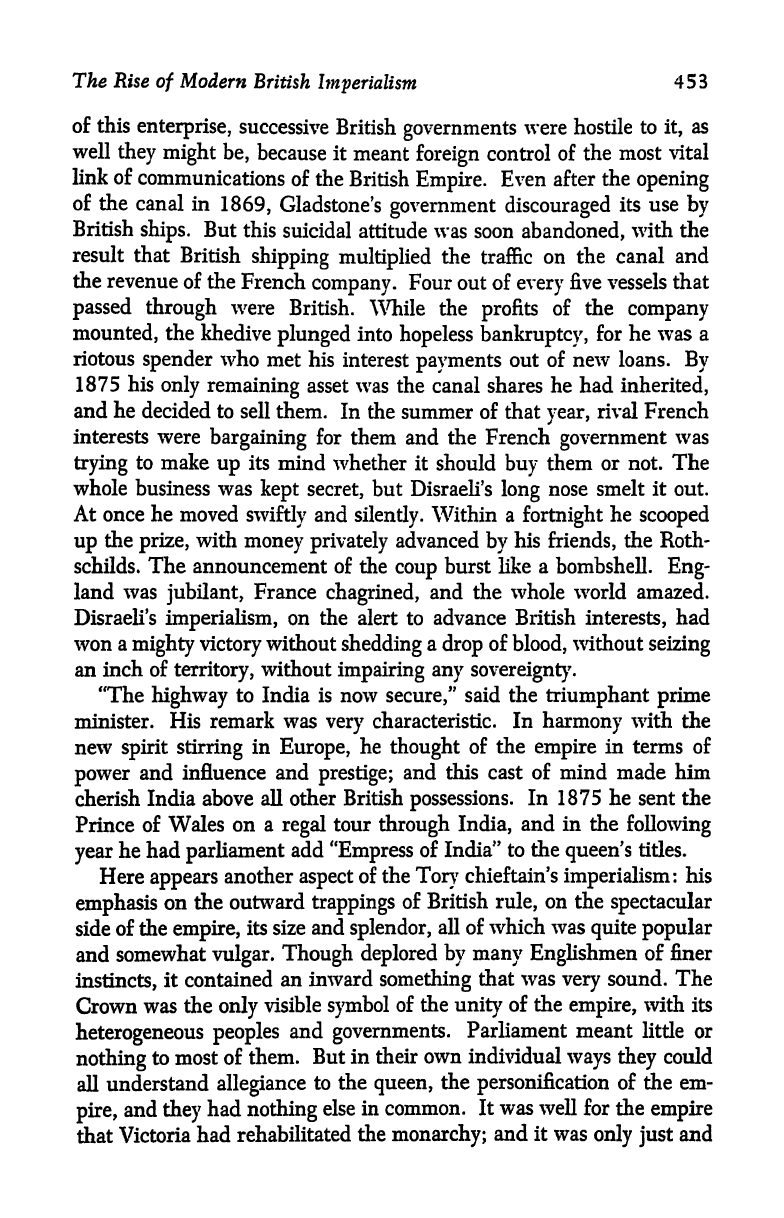
The
Rise
of
Modern
British
Imperialism
453
of this
enterprise,
successive
British
governments
were
hostile
to
it,
as
well
they
might
be,
because it
meant
foreign
control
of
the
most
vital
link of
communications
of the
British
Empire.
Even
after
the
opening
of the
canal in
1869,
Gladstone's
government
discouraged
its
use
by
British
ships.
But
this
suicidal
attitude was
soon
abandoned,
with the
result that
British
shipping
multiplied
the
traffic
on the
canal
and
the
revenue
of the
French
company.
Four out of
every
five vessels
that
passed
through
were
British.
While the
profits
of the
company
mounted,
the
khedive
plunged
into
hopeless bankruptcy,
for he
was a
riotous
spender
who
met his
interest
payments
out of new loans.
By
1875
his
only
remaining
asset was the canal shares
he
had
inherited,
and he
decided to
sell
them.
In
the
summer of that
year,
rival French
interests were
bargaining
for
them
and
the French
government
was
trying
to
make
up
its
mind
whether
it
should
buy
them
or not.
The
whole
business was
kept
secret,
but
Disraeli's
long
nose smelt
it
out.
At
once
he
moved
swiftly
and
silently.
Within a
fortnight
he
scooped
up
the
prize,
with
money privately
advanced
by
his
friends,
the Roth-
schilds.
The
announcement
of
the
coup
burst like
a
bombshell.
Eng-
land
was
jubilant,
France
chagrined,
and
the
whole
world amazed.
Disraeli's
imperialism,
on the alert to advance British
interests,
had
won
a
mighty victory
without
shedding
a
drop
of
blood,
without
seizing
an
inch of
territory,
without
impairing
any
sovereignty.
"The
highway
to India is
now
secure,"
said
the
triumphant prime
minister.
His
remark
was
very
characteristic.
In
harmony
with the
new
spirit stirring
in
Europe,
he
thought
of
the
empire
in
terms of
power
and
influence and
prestige;
and
this cast of mind
made
him
cherish
India above all other
British
possessions.
In 1875
he sent
the
Prince of
Wales
on
a
regal
tour
through
India,
and
in the
following
year
he
had
parliament
add
"Empress
of India"
to the
queen's
titles.
Here
appears
another
aspect
of
the
Ton
7
chieftain's
imperialism:
his
emphasis
on
the
outward
trappings
of
British
rule,
on the
spectacular
side
of the
empire,
its size
and
splendor,
all of
which
was
quite
popular
and
somewhat
vulgar.
Though
deplored
by many Englishmen
of finer
instincts,
it contained
an
inward
something
that was
very
sound.
The
Crown
was the
only
visible
symbol
of the
unity
of the
empire,
with
its
heterogeneous
peoples
and
governments.
Parliament
meant
little
or
nothing
to
most of
them.
But
in their
own individual
ways
they
could
all
understand
allegiance
to the
queen,
the
personification
of the em-
pire,
and
they
had
nothing
else
in common. It
was
well for the
empire
that
Victoria
had
rehabilitated
the
monarchy;
and
it
was
only just
and
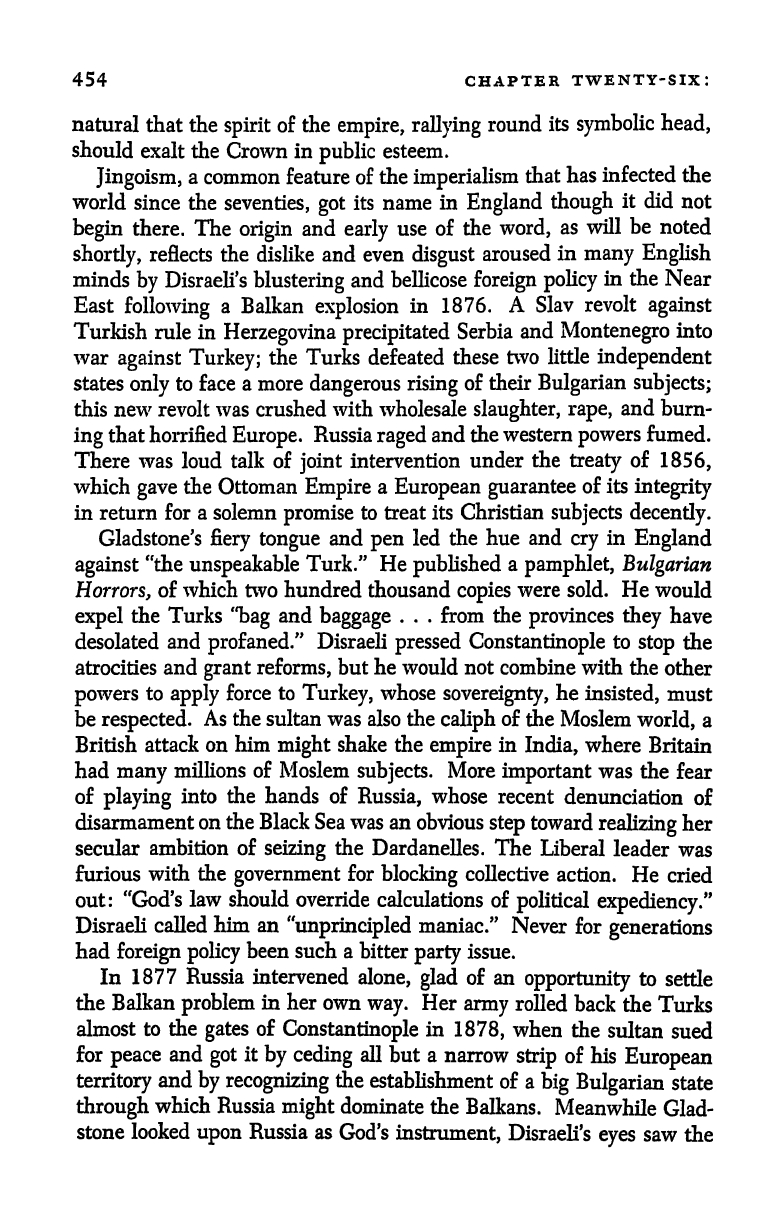
454 CHAPTER
TWENTY-SIX:
natural that the
spirit
of
the
empire,
rallying
round
its
symbolic
head,
should
exalt
the
Crown
in
public
esteem.
Jingoism,
a
common feature
of
the
imperialism
that
has
infected
the
world
since the
seventies,
got
its
name in
England
though
it
did
not
begin
there.
The
origin
and
early
use of
the
word,
as
will
be
noted
shortly,
reflects the dislike and even
disgust
aroused
in
many
English
minds
by
Disraeli's
blustering
and
bellicose
foreign
policy
in
the Near
East
following
a
Balkan
explosion
in 1876.
A Slav
revolt
against
Turkish
rule in
Herzegovina
precipitated
Serbia
and
Montenegro
into
war
against
Turkey;
the Turks defeated
these
two little
independent
states
only
to face
a more
dangerous rising
of their
Bulgarian
subjects;
this new revolt was crushed with wholesale
slaughter,
rape,
and
burn-
ing
that horrified
Europe.
Russia
raged
and the
western
powers
fumed.
There was
loud
talk of
joint
intervention
under
the
treaty
of
1856,
which
gave
the
Ottoman
Empire
a
European guarantee
of its
integrity
in return
for a
solemn
promise
to
treat its Christian
subjects
decently.
Gladstone's
fiery tongue
and
pen
led
the hue
and
cry
in
England
against
"the
unspeakable
Turk." He
published
a
pamphlet,
Bulgarian
Horrors,
of which two
hundred
thousand
copies
were
sold. He
would
expel
the Turks
"bag
and
baggage
.
. .
from the
provinces they
have
desolated
and
profaned."
Disraeli
pressed Constantinople
to
stop
the
atrocities
and
grant
reforms,
but he
would
not
combine with the
other
powers
to
apply
force
to
Turkey,
whose
sovereignty,
he
insisted,
must
be
respected.
As
the sultan
was also
the
caliph
of
the Moslem
world,
a
British
attack on
him
might
shake the
empire
in
India,
where
Britain
had
many
millions of Moslem
subjects.
More
important
was
the fear
of
playing
into
the
hands of
Russia,
whose recent
denunciation
of
disarmament
on
the
Black Sea
was
an
obvious
step
toward
realizing
her
secular
ambition
of
seizing
the
Dardanelles. The
Liberal
leader
was
furious
with the
government
for
blocking
collective
action.
He
cried
out:
"God's
law
should override
calculations of
political
expediency."
Disraeli
called him an
"unprincipled
maniac."
Never
for
generations
had
foreign policy
been such a
bitter
party
issue.
In
1877
Russia
intervened
alone,
glad
of an
opportunity
to
settle
the Balkan
problem
in her
own
way.
Her
army
rolled
back the
Turks
almost
to
the
gates
of
Constantinople
in
1878,
when
the
sultan
sued
for
peace
and
got
it
by
ceding
all
but
a
narrow
strip
of
his
European
territory
and
by
recognizing
the
establishment
of a
big
Bulgarian
state
through
which Russia
might
dominate the
Balkans.
Meanwhile
Glad-
stone
looked
upon
Russia as
God's
instrument,
Disraeli's
eyes
saw
the
